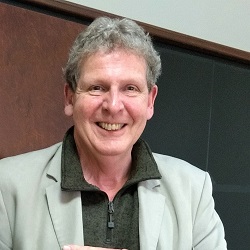
Greg Bankoff is a historical geographer who focuses on the way societies interrelate with their environments over time, especially the way people adapt to frequent hazards. For the last 25 years, he has focused his research primarily on Southeast Asia, Central Asia, the Pacific and the North Sea seeking to understand how societies, both past and present, have learnt to normalise risk and the manner in which communities deal with crisis through applied interdisciplinary approach that combines archival analysis with fieldwork, community mapping, interviews and focus groups.
He has published extensively including over a 100 referred journal articles and book chapters. Among his publications are co-authoring The Red Cross’s World Disaster Report 2014: Focusing on Culture and Risk and a companion volume entitled Cultures and Disasters: Understanding Cultural Framings in Disaster Risk Reduction (2015). Read more.
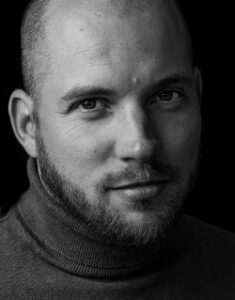
Jagt, van der Hans
Hans van der Jagt obtained his PhD from the Vrije Universiteit Amsterdam with a dissertation on the historical relationship between geopolitics, colonialism, militarism and ethics. He studied History at the University of Groningen and the Karl-Franzens Universität in Graz (Austria). Currently dr. Hans van der Jagt works as a associate senior research fellow at KITLV on the research-project ‘The role of the House of Orange-Nassau in colonial history’ and as a associate senior research fellow at the Institute of Security and Global Affairs of Leiden University. Furthermore he works for the Peace and Security Commission of the Advisory Council on International Affairs.
In his work Van der Jagt focuses on the history of colonial structures of power, geopolitical developments, military and international security strategy, defense-policy and emerging disruptive technologies. He wrote academic articles, government research-reports, and policy briefs and published the book Engelen uit Europa (Prometheus, Amsterdam 2022).
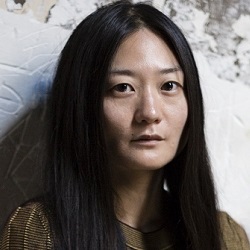
Jo, Clara
Clara Jo is an artist based in Berlin. She is a graduate of Bard College (NY) and the Institut für Raumexperimente / Universität der Künste Berlin. Her work has been exhibited and screened at ARKO Art Center (Seoul), Edith-Russ-Haus für Medienkunst (Oldenburg), Spike Island (Bristol), Royal Academy of Arts (London), Institute of Contemporary Arts (London), and Hamburger Bahnhof (Berlin). From 2022-2023 she was in residence at Art Explora Paris. From 2020-2021, she was a fellow at the Akademie Schloss Solitude in Stuttgart. In 2018, she received the Smithsonian Artist Research Fellowship. She has presented her work on panels at the Centre Pompidou (Paris), Stedelijk Museum (Amsterdam), King’s College (London), The Barbican Centre/The Trampery (London), and the Bartlett School of Architecture (UCL London). More information on Clara’s previous work.
Clara Jo is the new Atelier KITLV-Framer Framed Artist in Residence. In the coming months, she will work closely with KITLV & Framer Framed in developing her project ‘Epidemiological routes and ruptures in the Afrasian Sea’ through workshops and conversations around art, archive and activism.
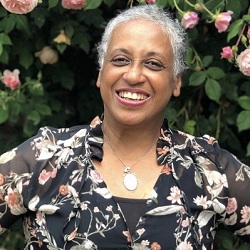
Nabibaks, Farida
Farida Nabibaks is founder and artistic director of music and dance-theatre company Reframing HERstory Art Foundation based in Arnhem. Farida uses dance and embodied knowledge to address the collective trauma of the colonial and slavery past, with the ultimate goal of healing. She studied Philosophy at the Radboud University Nijmegen and holds a MA in Philosophy of Behavioural Sciences. She was also co-researcher in the Radboud Institute for Culture and History (RICH) researchproject Feeling the Traces of the Colonial Past, led by professor Liedeke Plate. This was built around her performance Radiant Shadow, part one, Margaretha.
Farida will be an associate fellow at KITLV from 1 March until 1 October doing a practice-based research on healing from the colonial and slavery past through art, dance/ dance-theatre and embodied knowledge from multiple ethnic perspectives. Read more on Farida on the website of Mama Cash & Amsterdamse Hogeschool voor Kunsten.

Setijawati Soemarwi, Vera Wheni
Vera has started her career as an advocate. Her work focuses on access to justice and collective legal movement within the context of climate-related water management in an urban context. She has been involved in research on violations of human rights, land rights, properties, and development for the public interest. Her prior work has brought her to write research topics in those areas.
She is currently working on a PhD dissertation about access to justice for marginalized people facing climate-related water management issues in Jakarta, with Diana Suhardiman (KITLV) and Adriaan Bedner (VVI/KITLV) as supervisors. Her research focuses on marginalized communities’ efforts to seeking justice through collective action and social movements when they become victims of climate change adaptation programs. It looks at the process of enforcing and implementing the rule of law in the development of water development program in Jakarta, in response to climate change, and its relations with public interest. She is currently researching the contestation of debates between legal and illegal kampong dwellers, informal settlements, and informal land tenure ownership of urban communities. The book is a reflection of marginalized communities’ involvement in Jakarta to vindicate and achieve justice in resettlement of kampung dwellers.
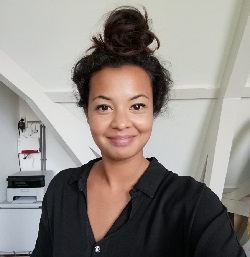
Tulder, Mirelle van
Mirelle van Tulder is the Atelier KITLV-Framer Framed Artist in Residence for 2024. Mirelle will start her residency in 2024 followed by a public presentation in 2025 at Framer Framed.Mirelle van Tulder holds an MA in Fine Art and Design from Werkplaats Typografie (2021-2023). She was a Research Associate at the Research Center for Material Culture, Wereldmuseum (2021-2023). Mirelle has worked as an image researcher for MacGuffin Magazine from 2019-2023.
During the Atelier KITLV-Framer Framed Artist in Residence program, Mirelle plans to investigate how graphic design has determined the classification of cultures and objects. By re-contextualizing archived materials such as catalogues and photo albums, she aims to reclaim the authority of the material and its associated histories. The aim of her research is to help us understand how power is organized through publishing doctrines, and to reveal the colonising principles that structure them. More.
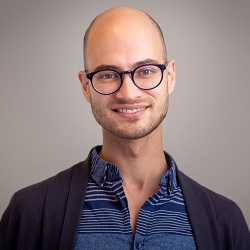
Vermeulen, Remco
Remco Vermeulen is coordinator for international cooperation on collection management at the Cultural Heritage Agency of the Netherlands, working on knowledge exchange and capacity building programmes in the context of the International Heritage Cooperation programme which is part of the International Cultural Policy of the Netherlands, as well as for the Consortium Colonial Collections.
Remco is an external PhD candidate at the Erasmus School of Social and Behavioural Sciences. His research focuses on colonial heritage engagement, particularly by young people, in postcolonial Indonesian cities. His teaching focuses on gentrification, colonial and postcolonial urbanism, particularly in Indonesia, the bilateral, cultural relationship between Indonesia and the Netherlands. For his previous position as advisor for cultural cooperation with Indonesia at DutchCulture, in 2023 Remco published article series ‘The story of the Erasmus Huis’, the cultural centre of the Dutch Embassy in Jakarta, with two Indonesian historians. The articles, along with short videos based on the articles’ content, have also been published in Indonesian on Historia.id.
OUR FELLOWS
Our institute hosts several international postdoctoral research fellows. KITLV fellows are invited to present lectures, participate in seminars and cooperate in the institute’s research projects. This page lists, in alphabetical order, the visiting fellows currently staying at the KITLV/Royal Netherlands Institute of Southeast Asian and Caribbean Studies.
Also interested in becoming a fellow at our institute? Click here to check out the different types of fellowships we have available at KITLV.




